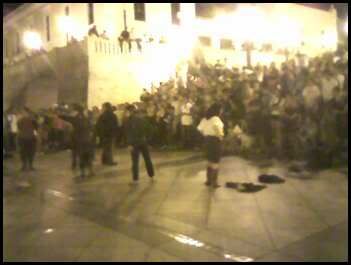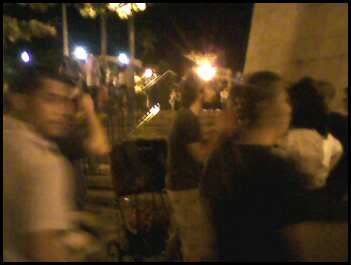We met through my mother. My mother lives in Old San Juan. I'm sick of the third-person. I am real. So is Rey. We have hugged. We have smoked joints together. We have walked the nights of Old San Juan under the orange lights of poles together. Rey used to work at Cafe Puerto Rico, a fantastic restaurant in front of la Plaza Colon in Old San Juan.
The first time we spoke we spoke of Bukowski. Then Rey serenaded some gringas and recited poetry. I gave him homemade chapbook: "Seeking the Cause and More." I was in love with Carolyn then. This is no longer true. One day i will forgive Carolyn. Maybe one day her family will forgive me.
Right now I am in love again. With who? I know. She probably knows. I won't speak names.
Who am I?
Is Rey in love? He flies to Chicago for a gringa's birthday. Yes, I think Rey is in love.
Wednesday, July 29, 2009
Friday, July 24, 2009

La tristeza,
...Qué te digo, es una perra. Uno se siente jaloneado por todo alrededor; redondeado en un abrazo fuerte de tiempo, de espacio, de confusión... miradas y soledad. Sólo queda el libro, aquella canción que se ha traído uno, cosas que no pueden olvidar los inmigrantes. Desarraigo. De todo, incluso de aquella última página que acabamos de maltratar.
Explorarse, encerrarse, trabajar hasta el cansancio, abarcar hasta lo imposible el estudio, amar a todas las criaturas errantes en los cuatro mundos, escuchar a Pink Floyd. Creérselo. Dibujar cerezos con acuarelas imaginables. Escribir hasta enfermarse, he ahí donde radica el problema: el artista es amalgama de carne y alma, de aire de raíz, un cielo al revés, el vaivén de una oropéndola.
Candela
Para mí tiene algo de pariente muerto, lejano, del cual uno nunca pudo llegarse totalmente a compenetrar. Pecaría si digo que pude haberla leído más. ¿Acaso no la viví? Yo viví en ese texto, eso sí te lo puedo decir. Me lo pasé por el cuerpo. entonces al parecer no tenía que releerlo más ná: los ojos son el equilibrio del cuerpo cotidiano. Para el cuerpo cotidiano el equilibrio es una metáfora.
...Qué te digo, es una perra. Uno se siente jaloneado por todo alrededor; redondeado en un abrazo fuerte de tiempo, de espacio, de confusión... miradas y soledad. Sólo queda el libro, aquella canción que se ha traído uno, cosas que no pueden olvidar los inmigrantes. Desarraigo. De todo, incluso de aquella última página que acabamos de maltratar.
Explorarse, encerrarse, trabajar hasta el cansancio, abarcar hasta lo imposible el estudio, amar a todas las criaturas errantes en los cuatro mundos, escuchar a Pink Floyd. Creérselo. Dibujar cerezos con acuarelas imaginables. Escribir hasta enfermarse, he ahí donde radica el problema: el artista es amalgama de carne y alma, de aire de raíz, un cielo al revés, el vaivén de una oropéndola.
Candela
Para mí tiene algo de pariente muerto, lejano, del cual uno nunca pudo llegarse totalmente a compenetrar. Pecaría si digo que pude haberla leído más. ¿Acaso no la viví? Yo viví en ese texto, eso sí te lo puedo decir. Me lo pasé por el cuerpo. entonces al parecer no tenía que releerlo más ná: los ojos son el equilibrio del cuerpo cotidiano. Para el cuerpo cotidiano el equilibrio es una metáfora.
Saturday, July 18, 2009
A Night for Theatre

The writer, the musician, and the painter lay on a banister close to la liga de arte. They roll a blunt. The artist acts as doctor Frankenstein with the phillie because it had been bought already broken in half. He is able to roll two mini-blunts and the musician wanders off with one of them to see if someone hanging out will lend him a lighter to light his blunt. After scaring off one group of people, after being ignored by another, the musician returns with the mini-blunt lit and they light the second one and pass it around themselves and get high. They are happy. They are now calmed. They can now have a conversation and bond. They talk about girls and all agree that they shouldn’t think about them and that they all need to only worry about doing their own thing, which means their respective arts. The girls will appear in due time. They compare their levels of fresconess, meaning, what is their current love-situations. They each claim to have someone they can depend on in times of need of sexual-relief. The painter is seeing an older art-teacher who calls him a chamaquito and who is right now travelling the U.S. for a month: New York, Chicago, then San Diego. The writer has a hippy girl who lends him her car so that he can drive out of town. The musician had a girl file a retraining order against him, and each time he plays a show he has to leave because she shows up hanging out with some other rival musician. They notice that a kid is trying to make out with a drunken girl who is wearing a light, thin dress that shows off her ass. She pushes the kid away from her body by pressing her hand against his face. The group of artists laugh between themselves. The kid eventually gives up and leaves her alone, and she wanders off stumbling into a dark street.

This is Old San Juan and many people are getting drunk and hanging out. The musician goes off to his show because he believes that the girl who has put an order against him must have already left and he has a show to play. The writer follows the painter to see some street theatre en la plaza del Totem. The actors are dressed as cops, cowboys, and bureaucrats. Many drunk people do not realize it is theatre or don’t care. They scream at the actors, and the art students who are doing the music and sound for the street-play have to get the actors to quit acting because the crowd of drunken people is getting too rowdy and throwing empty plastic cups of beer at the actors. One of the art students later on will have said that he saw a member of the crowd pull out a gun. One of the art students, after the theatre group has left the crowd of belligerent people being, says to whoever will listen to him, “And they ask why our country is so fucked. It’s because we have destroyed our own culture.”
There was no theatre that night and the drunken people got drunker.

Friday, July 17, 2009

SHINE
LET IT SHINE,
ON YOU.
LAURA IZIBOR
LET IT SHINE,
ON YOU.
LAURA IZIBOR
UNO.
No dormí ni un solo día.
Me la pasé conversando con fantasmas y fumando hasta el cambio de turno. Otro doctor y la misma mentira: la condición está mejorando. Estamos tan esperanzados… la infección cede.
Agradezco el gesto desesperado y bajo hasta el café. Las lenguas del sol queman las colas de los aviones. Pero no puedo irme. Soraida está allá arriba, atada a un cáncer de cama: equipos que respiran, excusas y sonidos intermitentes que intentan prolongarle la traición del cuerpo. ¿Podré asirme e insistir en que todo va a estar bien? ¿Que de algo han servido el reguero de flores que han enviado los que no se atreven a enfrentarla en el estado de huida? No. Quiero a la Soraida del abrazo de quebrantahuesos, la resplandeciente, quiero el tamaño de su mordida de bacana: necesito ondearme en el centelleo de su cuerpo.
Dos.
Tropecé con Soraida en un bar demasiado oscuro. Iba por el cuarto trago, sólo por ella. el bartender me sugirió: Llévale una heineken chico. Háblale.
Me volví treinta y tres miedos. La quemé con un cigarrillo.
Vamonos, me ordenó.
Tres.
Caminamos bordeando las murallas. Deteniéndonos para tomar sorbos de aliento: aires con olor a marejada, a deambulante, a orín yerba fresca.
Me llamo Jonás.
Lo sé, dijo con la cadena hermosísima de dientes de miel de leche.
Cuatro.
Salvo el sonido del viento escondiéndose entre las ruinas de la muralla y mi mano terseando su pelo, no se escuchó nada más… quizás alguna espuma de mar estrellándose en la piedra y renaciendo, creando orillas.
Tienes manos de maestro constructor… no puedes ser un mal tipo.
Me demoré en ripostar. Hice apuestas con algún demonio: esta noche la beso. Fui todo pálpito y tropiezo. Los dedos encontraron la boca y midieron.
No había nada que perder.
Cinco.
El doctor, un muchacho llamado Gaastra que nunca pudo adaptarse al dolor ajeno, fue quien me dijo toda la verdad entre cigarrillos. “Suba y confiésele todo porque… Bueno, quizás no quede mucho tiempo. No puedo decirle que lo siento.”
Seis.
Se deslizó un poco entre mis piernas, acomodándose. Proponiendo. Encontré fuerza y la enfrenté: quise escribir una novela pero todo me salía muy propio y personal. La nostalgia. Ya he abandonado todo eso y no hay nada de qué preocuparse, mentí.
Estremeciéndose de risa; elevándose por entre la espuma de las orillas cantó: la alegría no es sólo brasileira... La vida se me partió en dos y sentí una prisa adolescente; un gusano feliz y terrible revolcándoseme. Beso. Sonrisa, otra vez. La luna permitiendo la bahía, el viento retozando. La cadena de dientes blanquísimos, rechina que requeterechina…
Yo soy escritor. Y tú, ¿qué haces?... digo, además de leer la mano.
¿Yo?
Sí tú.
Yo.
Yo brillo.
Friday, July 10, 2009
Read an Andújar Story
One of the Riverbed's story-translations from Andújar's upcoming English debut, Amoricide, has been published at the Thieves' Jargon.
Check that out HERE.
Check that out HERE.
Monday, July 6, 2009
What is the Purpose of this Blog?
This blogsite has been created to document the process and collaboration between Andy Riverbed and Rey Emmanuel Andújar to produce the final product of Andújar's latest story collection, Amoricide, in English.
In this site both writers will be posting different types of messages, their different opinions, and their different lives, as they both struggle together to have this book finalized and published.
Word up, motherfucker!
In this site both writers will be posting different types of messages, their different opinions, and their different lives, as they both struggle together to have this book finalized and published.
Word up, motherfucker!
Subscribe to:
Comments (Atom)